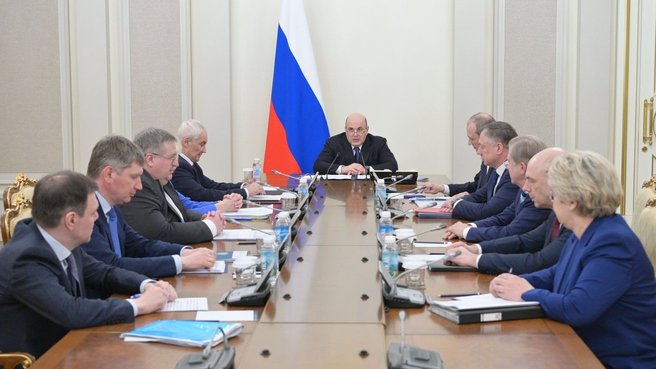On the agenda: extending the programme for synchrotron and neutron research development, subsidies for farmers’ preferential lending, the procedure for subsidising the affordable rental housing programme in the Far East.
Mikhail Mishustin’s opening remarks:
Good afternoon, colleagues.
Let us begin today’s meeting by discussing scientific advancement, an area ofutmost importance given the ambitious goals set by the President. We are consistently enhancing our scientific potential through a diverse array of measures. Notably, we are advancing the programme for synchrotron and neutron research development, aimed at establishing a network of cutting-edge megascience facilities. These include the Siberian Ring Photon Source (SKIF) in Koltsovo, the Russian Photon Source (RIF) on Russky Island, the PIK reactor in Gatchina, and the Kurchatov Synchrotron Radiation Source (KISI-Kurchatov) in Moscow. These facilities will enable us to gain insights into the structure and activity mechanisms of substances, paving the way for the creation of innovative materials.
As per the President’s instructions, we are extending this project until 2030, with approximately 450 billion roubles earmarked for this purpose.
These funds will be directed towards fostering breakthrough technologies, enhancing and modernising research infrastructure to surpass both existing and projected international sources of synchrotron and neutron radiation. They will support grant programmes for projects and the training of specialists and scientific personnel in this important field.
It is imperative that we take all necessary measures to rapidly improve our competencies in key industries and achieve technological sovereignty for our country.
The next topic on the agenda is the agroindustrial sector.
In the Government’s annual report to the State Duma, I noted that this sector stands out as one of the most robust in our economy. Last year witnessed the second-highest grain harvest in contemporary Russian history, largely due to state support, with over 440 billion roubles allocated solely within the state programme framework.
The President emphasised the importance of enabling agricultural enterprises to access sufficient borrowed funds to fulfil their ongoing objectives.
The Government places special emphasis on this matter. Just a year ago, over 200 billion roubles were designated for the implementation of the programme for preferential lending to farmers. This year, we are allocating almost 215 billion roubles.
To subsidise new investment loans, we are adding an extra 5 billion roubles. This will help entrepreneurs expand agricultural production, enhance processing capabilities, establish state-of-the-art farms, construct storage facilities, and procure all essential materials for the sowing season. This initiative aims to offer consumers a broad range of products.
Now, let us move on to the support provided to the Far East.
The President emphasised the importance of fostering economic growth in the macroregion, facilitating the opening of efficient production units, generating new employment opportunities, and creating modern and comfortable living conditions for residents.
The government has initiated a series of comprehensive measures to develop these territories, including an affordable rental housing programme. This programme, launched last year based on the President’s instructions, has been allocated 87 billion roubles. As a result, approximately 10,000 flats are slated for construction. The initial batch has already been occupied in Chukotka, Primorye, and Yakutia. Agreements have also been finalised for the purchase of over 5,500 flats across nine Far Eastern regions.
Students, young professionals, skilled workers, and participants in the special military operation are eligible to benefit from this preferential programme.
To ensure that their rental housing costs remain below market rates, a portion of the monthly payments will be subsidised using government funds. The process for accessing these subsidies is outlined in a Government resolution.
For the first five years, tenants will only be required to pay one-third of the rental cost, with a gradual increase over time, reaching full payment by the tenth year of residence.
We anticipate that this long-term leasing mechanism will create comfortable living conditions for local residents while also attracting professionals from other regions of Russia to the Far East.









